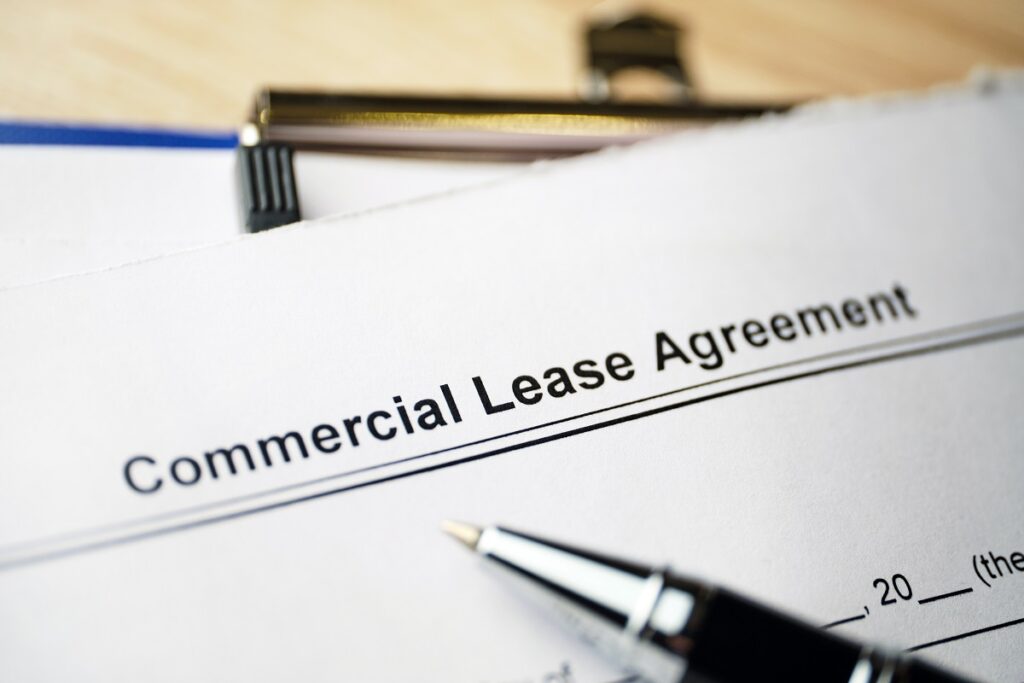Early termination of commercial lease agreements can often lead tenants to seek an early termination of their lease. Whether due to business changes, relocation, financial constraints, or unforeseen circumstances, tenants may wish to terminate their commercial lease before the contract’s expiration. However, terminating a commercial lease early is not always straightforward, and tenants must be aware of their legal rights and options available under the law to minimize penalties or resolve the issue amicably.

In Dubai, early termination of commercial leases is governed by various provisions under the legal framework, and tenants must consider several factors when making this decision. This comprehensive guide will explore the process, legal protections, and potential consequences of ending a commercial lease early in Dubai.
Legal Framework Governing Commercial Leases in Dubai
Commercial leases in Dubai are primarily governed by Law No. 26 of 2007, which was later amended by Law No. 33 of 2008. This legal framework provides the foundation for leasing agreements, outlining the rights and obligations of both landlords and tenants. However, it does not explicitly address the early termination of commercial leases, meaning the terms of the lease agreement are typically the primary reference point for resolving disputes and understanding rights and obligations.
While tenants may not have an automatic right to terminate a lease early, understanding the provisions within the lease agreement and Dubai’s legal environment can help them mitigate penalties and pursue an amicable exit. The laws emphasize adhering to the terms of the lease; however, there are several ways tenants can legally end their lease early based on the terms outlined in their contract or through negotiations with their landlords.
Common Legal Protections for Tenants Seeking Early Termination of Commercial Lease
Tenants seeking to terminate a commercial lease early may be entitled to certain legal protections under their lease agreement or through negotiations. Below are the primary options that can help tenants navigate early termination of commercial lease:
1. Break Clauses
A break clause is one of the most common provisions found in commercial leases that allows either party (tenant or landlord) to terminate the lease before its expiration. A break clause specifies the terms under which a tenant can terminate the lease early, often requiring the tenant to provide adequate notice, usually between one to three months, before exercising their right to exit the lease.
Conditions for a Break Clause: The conditions for terminating the lease under a break clause are clearly outlined within the lease agreement. These conditions typically include:
- Notice Period: Tenants must give formal notice to the landlord within a specified time frame.
- Penalty or Compensation: Tenants may have to pay a penalty or compensation for exercising the break clause, depending on the terms of the lease.
- Timing: Some break clauses can only be activated after a certain period of time, such as after the first year of the lease.
Negotiating a Break Clause: In situations where a break clause is not present in the lease agreement, tenants may have the option to negotiate its inclusion during lease discussions. Negotiating a break clause provides tenants with the flexibility to exit the lease if future business circumstances change, such as downsizing, relocating, or facing financial difficulties.
2. Mutual Agreement
One of the simplest ways to terminate a lease early is through mutual agreement between the landlord and the tenant. If both parties agree to end the lease early, the tenant can avoid penalties, and a fair exit strategy can be established. This option is particularly useful when the tenant’s business circumstances change or if the tenant is facing financial challenges that make continuing the lease untenable.
The Negotiation Process: To facilitate a mutually agreed termination, tenants should:
- Communicate Openly: It’s important to approach the landlord proactively, explain the situation honestly, and negotiate terms that are favorable for both parties.
- Seek Amicable Resolution: In many cases, landlords may be willing to accept a negotiated termination if they can find a replacement tenant or adjust the lease terms to their advantage.
- Ensure Written Agreement: Any termination agreement should be put in writing to prevent potential disputes in the future.
3. Breach of Contract by the Landlord
If the landlord fails to fulfill their obligations under the lease agreement, tenants may have grounds to terminate the lease early without facing penalties. Common breaches by the landlord include:
- Failure to Provide Necessary Repairs: If the landlord does not maintain the property as required, such as not fixing damaged structures or not providing essential services like air conditioning or water, tenants can request early termination of commercial lease.
- Failure to Maintain Safe Conditions: If the property is deemed unsafe for occupancy, such as hazardous electrical wiring or fire safety issues, tenants may be entitled to terminate the lease.
Documenting the Breach: To pursue early termination of commercial lease due to a breach by the landlord, tenants must keep detailed records of any issues and document communications regarding unresolved problems. Evidence such as photographs, written complaints, and repair requests will strengthen the case for early termination of commercial lease.
4. Force Majeure Clauses
A force majeure clause is often included in commercial lease agreements, and it allows tenants to suspend or terminate their lease obligations under certain unforeseen circumstances beyond their control. Such events include:
- Natural Disasters: Earthquakes, floods, or other natural events that disrupt the tenant’s ability to use the leased space.
- Government Actions: Changes in laws, government regulations, or other actions that restrict the tenant’s business operations.
If a force majeure event occurs and significantly impacts the tenant’s ability to continue the lease, the tenant may be able to invoke this clause for early terminatation of commercial ease early without incurring penalties.
5. Legal Grounds for Termination
In addition to the conditions outlined above, tenants may have legal grounds for terminating their lease early in certain situations. These include:
- Failure to Provide Possession: If the landlord fails to deliver possession of the premises as agreed upon in the lease, tenants can terminate the contract.
- Unlawful Entry by the Landlord: If the landlord enters the property without providing the proper notice or without legitimate reasons, the tenant may have grounds for termination based on a violation of their privacy and rights.
Steps for Tenants Considering Early Termination of commercial lease
If you are a tenant considering the early termination of commercial lease, there are several important steps to follow to ensure that your rights are protected and to minimize potential penalties:
1. Review the Lease Agreement
Before taking any action, tenants should thoroughly review the terms of their lease agreement. Look for any clauses that provide for early termination of commercial lease, such as break clauses, force majeure clauses, or conditions for breach of contract by the landlord. Understanding these terms will help tenants determine their options and assess the potential penalties for early termination of commercial lease.
2. Consult Legal Professionals
Consulting with a lawyer or legal professional who specializes in commercial real estate is essential for tenants considering early termination of commercial lease. A lawyer can help tenants understand their rights under Dubai law, evaluate their lease agreement, and guide them through the legal process of early termination of commercial lease.
3. Communicate with the Landlord
Once you have reviewed the lease and consulted with legal professionals, the next step is to communicate openly with the landlord. Clearly explain your situation and seek a mutually agreeable solution. In some cases, the landlord may be willing to negotiate terms that reduce penalties or provide an easier exit strategy.
4. Document Everything
It is important to keep detailed records of all communications with the landlord, including emails, letters, and phone calls. This documentation may be necessary if any disputes arise or if you need to prove that the landlord failed to meet their obligations.
5. Explore Negotiation Options
If the lease agreement does not contain a break clause or other provisions for early termination of commercial lease , tenants can still explore negotiation options. This might include offering to find a replacement tenant, agreeing to pay a reduced penalty, or working with the landlord to reach a fair resolution.
Potential Penalties for Breaking a Commercial Lease Early
While there are legal protections for tenants seeking early termination of a commercial lease, tenants should be aware of the potential penalties and financial consequences that can arise when breaking a lease prematurely:
1. Financial Compensation
Tenants who terminate a lease early may be required to compensate the landlord for lost rental income during the remaining term of the lease. This compensation is typically negotiated and could be based on the remaining lease period or a lump sum payment.
2. Forfeiture of Security Deposit
Landlords often retain security deposits to cover unpaid rent, property damage, or breach of lease terms. If tenants terminate the lease early, the landlord may withhold part or all of the security deposit as compensation for the remaining term of the lease.
3. Legal Fees
If the dispute over early termination of commercial lease escalates and requires legal intervention, tenants may incur legal fees associated with litigation or mediation. It is important to try to reach a mutually agreeable solution to avoid these additional costs.
Conclusion
Tenants in Dubai seeking early termination of their commercial lease have several legal protections and options available to them. By understanding the terms of their lease agreement, including break clauses, mutual agreement options, and potential breaches by the landlord, tenants can mitigate penalties and navigate the complexities of early lease termination. Consulting legal professionals, maintaining open communication with landlords, and keeping detailed records are key steps in protecting your rights while managing changes in business circumstances.
By knowing your rights and options, tenants can approach early termination of commercial lease with confidence and work toward a solution that minimizes penalties and ensures a smooth transition.
Mazen Alzoubi – Commercial Consultant
Other Useful Links








